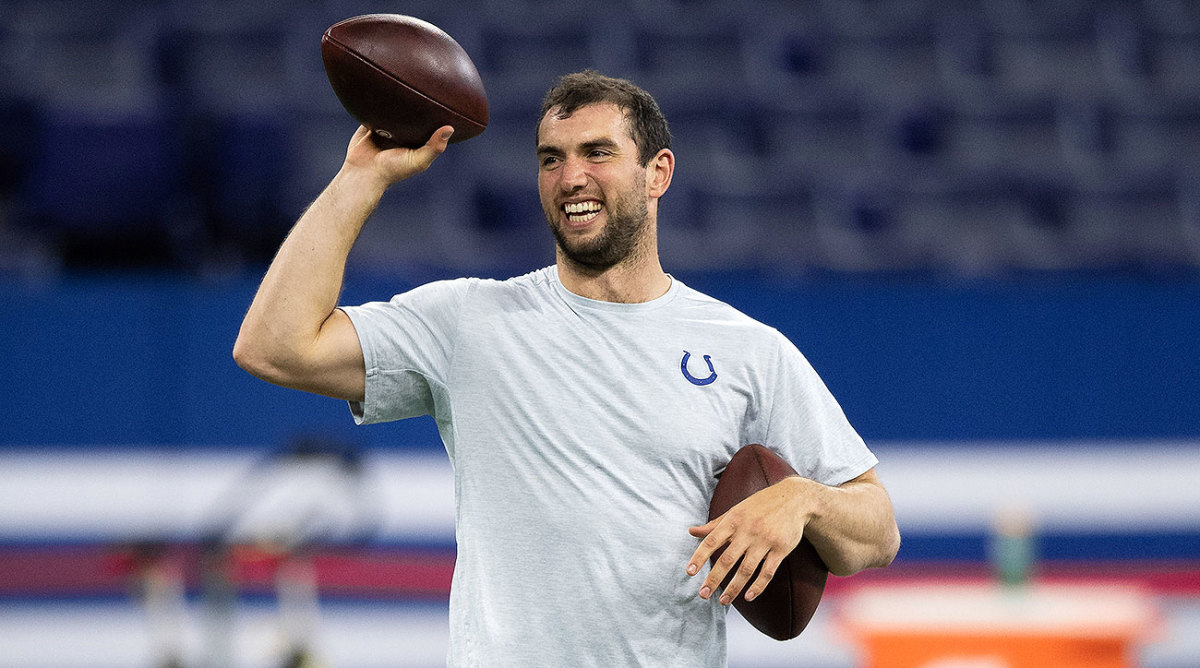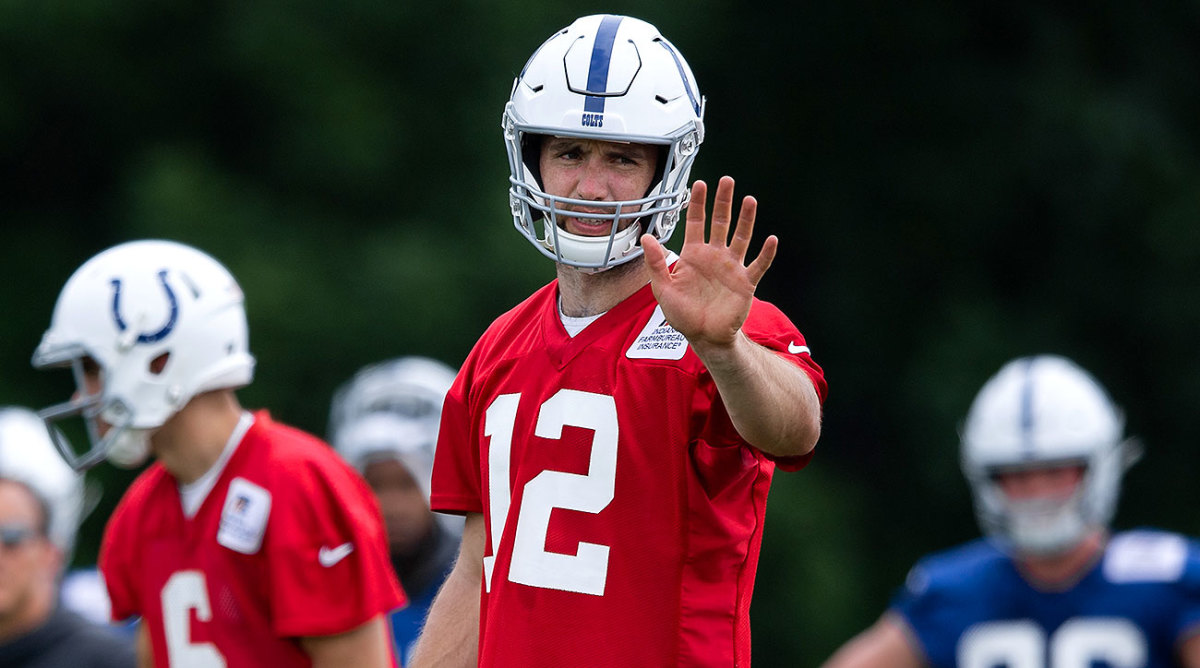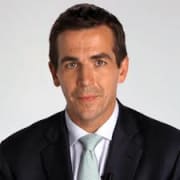What We Know About Andrew Luck’s Decision to Retire From the NFL

Andrew Luck was sitting on a metal bench between two turf fields, inside a cavernous field house at Grand Park. What had been a normal training-camp talk between us was evolving into one on life perspective after a catastrophic shoulder injury robbed him of a full year of his NFL career in 2017.
During that conversation, Luck said that he was focusing on being better than he was the last day, which meant improving the ankle injury that was bothering him, too. He said he was challenging himself to be a better quarterback than he’d ever been, and that “If I lose that motivation, I think it’s time to not play. I don’t see how it would be fun.” He said he’d found peace and balance in his life.
So I asked, with the second phase of his career underway, if he knew how much longer he wanted to play?
“No, I don’t.” he answered.
What, then, did he think seeing Tom Brady and Drew Brees playing into their 40s? Could see himself as that guy in 2029?
“They are so impressive,” he responded. “I mean, they really are, Philip [Rivers] and Eli [Manning], so much respect for them—really. I love watching them.”
This conversation happened four weeks ago. And now it’s all over for Luck.
Phase II of Luck’s career—his 2018 season—will go in the books as a one-year meteor. It started with a lot of doubt, and ended with the Colts winning nine of 10 games, advancing a round in the playoffs, and the 29-year-old taking home Comeback Player of the Year honors. That he accomplished that alone was remarkable, given all that he went through with injuries in 2015, ’16 and ’17. That should not be forgotten.
And yet, his career is going to go down as a giant what-if. Make no mistake about it—Luck was the closest thing the NFL has had to what LeBron James was coming into the NBA in 2003, a truly generational prospect at the most important position in sports, and probably the best prospect at that position since John Elway arrived in Denver in 1983. When he was healthy, he delivered on all that promise too. Which makes this feel like such a shame.
But the reason it really isn’t is that the guy in the middle of it—Luck himself—never looked at it like that. It’s his life to live, and I’m not sure he ever worried much about fulfilling all the expectations other people had for him.
In fact, I think he retired at 29 because he learned to worry more about expectations he had for himself than those the rest of us set for him. He always set those high. It’s just the target that changed.

When Luck and I talked a year ago, he seemed so happy, with the worst of his injury seemingly in the rear-view mirror. I asked him what he loved most about football, and he quickly answered, “When you can go out and throw balls with your friends, it’s good.” Would he have answered that question the same before his injury? “Probably not.”
Looking back, it’s easy for me to see now that Luck was just chasing what we all seek: happiness, in his professional life and in his personal life. And he was sure that after a dark couple of years, a time during which he actually thought it might be over, he’d found it. He was on the cusp of again being the quarterback he’d been before. He was months away from marrying Nicole. Everything was right again, and it was rewarding for him, because it wasn’t easy getting there.
It was rewarding, too, because he heard it from the people around him, the people that really matter to him. You seem happier, Andrew. You seem less burdened, Andrew. At the same time, he knew that a football injury created his lows, and he knew he had to keep working on staying injury-free.
“One of the big things, and I still struggle with, I realize you don’t just get it and you’ve got it forever,” Luck told me, snapping his fingers, on that day back in late July. “I eff up constantly. There’s always something. That’s the beauty of life, I guess.”
That’s why what Luck dealt with over the last couple months had to be so daunting.
It’s easy to forget that his shoulder injury wasn’t a straight-line situation. When he first got hurt in September 2015, no one told him that recovering from this injury would turn into a three-year process. He played through the injury in 2016. In 2017, the Colts thought he’d be ready for camp. Even when he wasn’t, they took him off PUP that September, which implicitly said they believed he’d be back within the first six weeks. They didn’t officially shut him down until that November.
You want to know how you get in a “dark place” as a football player? Luck’s injury situation is how, and it was only exacerbated by a list of separate injuries he endured that included torn cartilage in his ribs, a torn abdomen, a lacerated kidney and a concussion.
Put yourself in Luck’s shoes for a moment: If this calf injury, which became an ankle injury (when we talked four weeks ago, he referred to it exclusively as an ankle injury), was not only creating pain, but also confusion, of what would you be reminded? Would you be able to ignore the last four years of your life? Or would you immediately be thinking, here we go again?
Again, the level of Luck’s expectations haven’t changed, and wouldn’t for the kind of achiever who’d graduate from Stanford with a degree in Architectural Design, while guiding the school’s football program to its best two-year stretch (23 wins bested the school’s previous two-year record of 18 wins), and becoming the No. 1 overall pick in the NFL draft.
After what he had been through, the expectation wasn’t a Super Bowl championship or the MVP award so many of us, myself included, expected him to vie for this year. The expectation, I believe, was personal happiness and fulfillment.

Luck landed in Indianapolis because he was replacing a player, Peyton Manning, who went through something similar to this—an injury that was thought to require a relatively short-term fix but metastasized into something much worse. However there are distinct difference between Manning’s situation and Luck’s.
First, Luck was 28 years old during the year he missed. Manning was 34, having already won a championship, made 10 Pro Bowls and won four NFL MVPs.
Second, Manning needed football like he needed to draw his next breath, something that was proven out by the intensity with which he approached his comeback. He eventually got back, played four years in Denver, made two Super Bowls, and absolutely rode his NFL life until the rims came rattling off the wheels. Similarly, I think Tom Brady, Manning’s biggest rival, almost fears what his life will be like without the competitive drumbeat of football.
Luck was never that guy, and we all sort of knew that, too. Luck was someone who came off as naturally nerdy, with an amazing intellectual curiosity, who’d be just as comfortable hanging out at the library at Stanford or backpacking through Europe, as he was with his football teammates. More than just that, he was so comfortable with all of it, and in his own skin, bringing the kind of authenticity that made the guys in the locker room love him.
Eighteen months ago, I remember being with a bunch of coaches and scouts at the NFL combine, and a buddy of ours who has known so many of these quarterbacks forever, threw out that he thought Luck might not come back from the shoulder injury. It wasn’t that this guy had inside info on what was bothering Luck. He just had knowledge of who Luck was.
Ultimately, he was wrong about that, since Luck came back to win the 2018 Comeback Player of the Year award, but had the right idea—that Luck didn’t need football the way so many other guys do.
If Luck found contentment and happiness by playing in the NFL, if he achieved that expectation for himself within the context of the game then, well, great. And I think he did get there in 2018. Unfortunately for the rest of us, that happiness Luck found from the NFL was temporary. He got hurt again, and the idea of going through what he had before to keep playing wasn’t in line with his new expectations for himself.
Fortunately for him, he’s achieved wealth beyond what 99.9999% of us will ever know and has the freedom to make a choice like this. And now, he can continue on the path he set out for himself coming back from the shoulder injury without the burden of the past hanging over him.
On that day in July, I asked him if he thought that, maybe 10 years from now, he’d see the shoulder injury as a blessing in disguised. He stopped me, before I could finish the question.
“I’ll say it right now—I think it was a blessing in disguise,” Luck said. “Absolutely. It forced me to reevaluate many, many things in my life. And the result has been … really positive. And I shudder to think of not having that. I don’t think I’m married if that had not happened. I think I eff that up. I truly do. I truly do.
“I mean … Now it’s all good.”
Luck, it turned out, already had the perspective on a catastrophic event in his life that it’d take so many other people years to come to. And I think only with that perspective could he make a decision like this.
So maybe we shouldn’t feel sorry for him. Maybe we should be happy for him. Because now, he can chase the expectations that really matter, those that he has for himself.
Question or comment? Email us at talkback@themmqb.com.
